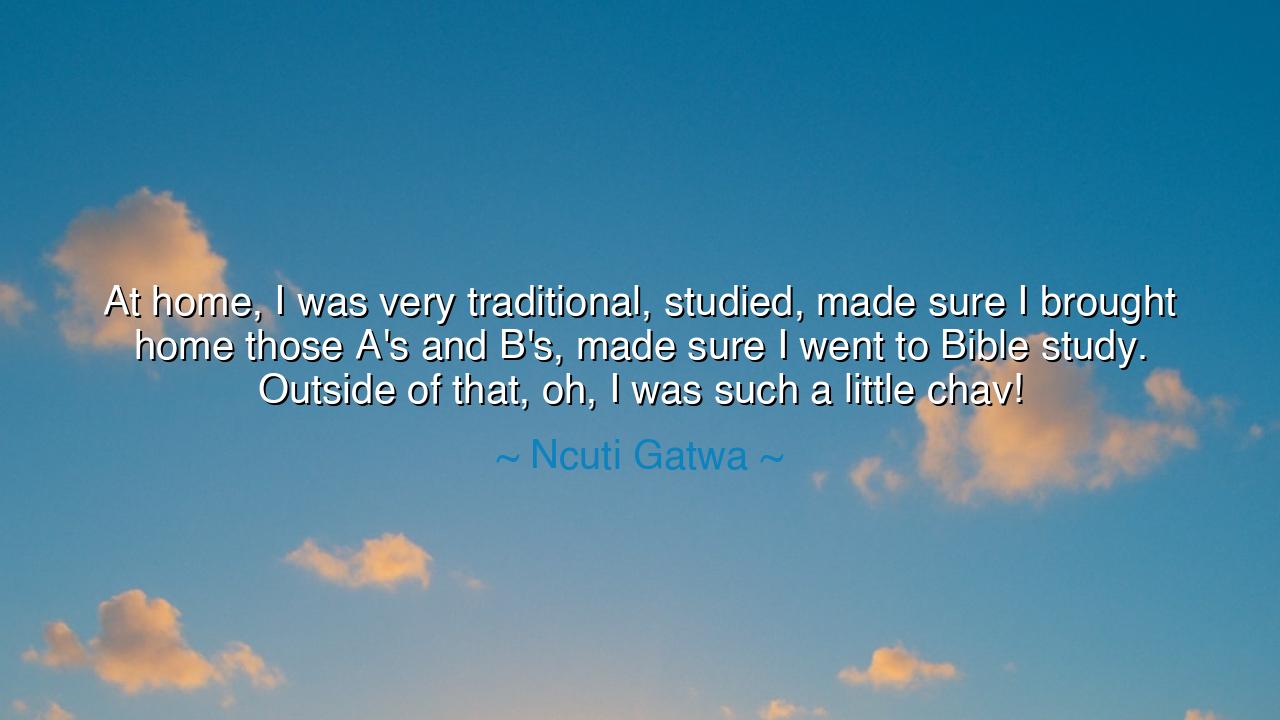
At home, I was very traditional, studied, made sure I brought
At home, I was very traditional, studied, made sure I brought home those A's and B's, made sure I went to Bible study. Outside of that, oh, I was such a little chav!






In the house of beginnings, a young voice remembers its two masks and laughs with tenderness: “At home, I was very traditional, studied, made sure I brought home those A’s and B’s, made sure I went to Bible study. Outside of that, oh, I was such a little chav!” So speaks Ncuti Gatwa, confessing the ancient tension between duty and display, chapel and street, parchment and pavement. The saying is bright and double-edged: on one face, the careful child who honors the ledger of grades and prayers; on the other, the swaggering sprite who learns the dance of his neighborhood. This is not hypocrisy; it is navigation. In lands of migration and modernity, the young often carry two passports—one stamped by the elders’ hopes, the other by the city’s weather.
Hear the wisdom beneath the jest. To be traditional at home—to study, to collect A’s and B’s, to keep the hours of Bible study—is to water the root, to pledge allegiance to those who built a table in a new country with old tools. To be a little chav outside is to learn the grammar of survival and belonging among peers: the slang that signals you understand, the style that says you are not afraid. The soul does not split; it stretches. Like a bow strung tight, it holds two pulls at once—reverence and rebellion—so that one day it can send an arrow far.
This double schooling has old names. The Japanese call it honne and tatemae—the inner truth and the public face. Our grandmothers called it “mind your manners in the house, keep your wits in the street.” Philosophers name it code-switching, the art of changing keys without abandoning the melody. In such arts, the young learn that identity is not a single statue but a courtyard with many doors: you may enter through study, through worship, through fashion, through humor—and still find the same hearth burning at the center.
Let a story walk beside the quote so its sandals raise real dust. In South London, a boy named K. rose before dawn to iron his uniform, recite a verse, and review his chemistry notes—his mother’s empire of order. After school, he slipped into a different armor: trainers loud as sirens, cap low, vowels widened to match the estates. With one crew, he traded exam tips; with another, he traded lyrics. One night the two worlds collided—his teacher met him on the bus as he performed his loudest self. For a breath he burned with shame. The teacher only smiled: “I like both of you. Make sure both get home safe.” K. carried that sentence like a talisman. He did not abandon the street’s stride; he refined it. He kept the A’s and B’s, kept the Bible study, kept the jokes and the jumpers—and became a mentor fluent in both sanctuaries.
History, too, holds mirrors. Shakespeare’s Prince Hal drinks with rascals in Eastcheap and studies the solemn craft of kingship in secret; when the hour ripens, he draws from both wells and becomes Henry V. His tavern tongue teaches him the hearts of common men; his courtly lessons teach him the weight of command. So with Gatwa’s confession: the little chav learns courage, timing, and camaraderie; the traditional student learns endurance, reverence, and aim. When braided, these strands make a rope strong enough to lift a life.
What, then, is the lesson to pass down like bread still warm? Do not despise your two schools. Honor the house that taught you to study and to pray; honor the street that taught you to speak and to stand. Yet let conscience be the steward: carry the dignity of home into the outside, and carry the creativity of outside back home. A life becomes fractured only when one mask is worn as a prison and the other as a weapon. Worn as tools, they carve character; worn with gratitude, they harmonize.
Take these practices as provisions for the road. (1) Keep a weekly ledger of selves: where did you switch codes, and did each serve your deepest values? (2) Guard a sacred hour for learning—scripture, science, or both—so your A’s and B’s are anchored in meaning. (3) Curate your outside—friends, fashion, fun—so swagger never costs you kindness. (4) Find a third place—a studio, stage, or sport—where both selves can breathe together. (5) When you rise, turn and lift: tutor someone after school, bring a friend to Bible study or book club, translate the languages of your world for those who only speak one. Do this, and your jest will become a jewel: not a confession of conflict, but a testimony of synthesis—proof that a heart can be both chapel and street, and walk out singing.






AAdministratorAdministrator
Welcome, honored guests. Please leave a comment, we will respond soon